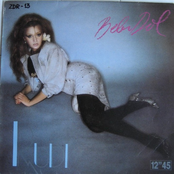Rudi

Biography
Bebi Dol (Serbian: Беби Дол; Serbian spelling for English Baby Doll) is a Serbian female pop, new wave, art-rock performer. Born Dragana Šarić (Serbian Cyrillic: Драгана Шарић) on October 2, 1962 to a musical family in Belgrade (her father Milenko was a jazz musician), she started her musical activity during the late 1970s in a band called Tarkus. By 1981 she hooked up with Goran Vejvoda and Vd to form a short lived Annoda Rouge, which never recorded any official releases. She turned to solo c...
Bebi Dol (Serbian: Беби Дол; Serbian spelling for English Baby Doll) is a Serbian female pop, new wave, art-rock performer.
Born Dragana Šarić (Serbian Cyrillic: Драгана Шарић) on October 2, 1962 to a musical family in Belgrade (her father Milenko was a jazz musician), she started her musical activity during the late 1970s in a band called Tarkus. By 1981 she hooked up with Goran Vejvoda and Vd to form a short lived Annoda Rouge, which never recorded any official releases.
She turned to solo career and in collaboration with Vejvoda soon released a 2-side single "Mustafa" / "Na planeti uzdaha" for PGP RTB, which immediately got a lot of attention. The A-side track "Mustafa" was declared the song of the year in 1980, and Bebi Dol got the award for the best new act of the same year.
Encouraged with all the success she started working on the full length debut album that eventually appeared in 1983 under the name Ruže i krv (Roses and Blood). It brought her further success as it gained exceptionally positive reviews and commercial reception, even achieving the best debut album of the year award. In addition to "Mustafa", the other tracks that achieved sizable popularity were "Rudi", "Ruže i krv", "Lapis lazzuli".
Then, somewhat surprisingly considering her popularity in SFR Yugoslavia, she spent a couple of years (between 1984 and 1986) in Egypt where she took a lucrative offer for the singing engagement in Cairo's Sheraton hotel.
In 1986 she returned to Yugoslavia and won the main prize at the Belgrade music festival (MESAM) with song "Insh-Allah", inspired by Oriental culture and music.
In 1987 Bebi Dol tried a second time for another the Yugoslav National Eurovision final with song "Zrno nežnosti" (Pearl of Gentleness) which took the fourth spot in national contest. The following year, she finished third with "Zatvori mama prozore" (Close the Windows, Mum). She also took part in MESAM with song "Slatke suze ljubavi" (Sweet Tears of Love) and took second spot later in 1988.
In 1989, Bebi Dol appeared yet again at MESAM, winning third place with a ballad "Kad sreća odlazi" (When the Happiness is Gone). According to the jury, this was the best song of the festival, and thus won the special prize. Year 1990 saw another try at MESAM, but this time, she had to settle for tenth place.
In 1991 Bebi Dol finally won the National Eurovision Contest and went on to represent Yugoslavia in Rome with song "Brazil". However, she took only one point for the evening, which may have been a reaction to the political situation in Yugoslavia because back home, the song became a huge hit, and the copyright was sold to Italy, Greece and Benelux countries.
After this disappointing result, Bebi Dol left the spotlight for four years, returning in 1995 with her second album Ritam srca (The Rhythm of the Heart). The album featured a few new songs (in dance rhythm), as well as the song "Brazil" in two versions, and song "Slatke suze ljubavi" from 1988. The interesting moment is the cover of Madonna's "Take a Bow", which was entitled "Pokloni se". The album achieved significant popularity at the time.
This was followed by more public inactivity during the late 1990s, before she finally reappeared in 2002 with her third album Ljuta sam (I'm Angry). However, the album was not well received either by the critics who had only good words for the album's production quality or the general public. Only two tracks achieved modest radio play - "Krv, sreća, suze i znoj" (Blood, Happiness, Tears and Sweat) and "Smejem se" (I'm Laughing).
In 2003, she took part in the Serbian Eurosong selection semi-final with song "Tvrdoglava" (Stubborn).
In December 2006, she realesed her new CD of covers titled Čovek rado izvan sebe živi. The album includes new renditions of classics such as "Help", "Papa's Got A Brand New Bag," "Moon River" and a beautiful version of Billy Strayhorn's "Lush Life". Read more on Last.fm. User-contributed text is available under the Creative Commons By-SA License; additional terms may apply.
